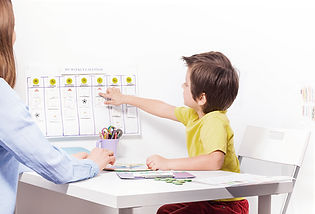
Parent Concerns
Sensory Processing
Sensory processing refers to the way the brain registers, processes and modulates sensory information through a variety of sensory channels, including tactile, visual, auditory, proprioceptive and vestibular. Sensory modulation refers to the ability of the brain to regulate and organize reactions to sensory input in a graded manner. Sensory processing or sensory modulation is closely related to organizational skills, as it influences the child's arousal level and the ability to self-regulate to participate in novel and familiar activities of daily living.
Sensory Processing Disorder refers to a neurophysiologic condition in which sensory input either from the environment or from one’s body is poorly detected, modulated, or interpreted and/or to which atypical responses are observed. (Miller 2013)
Commonly presented symptoms:
-
Difficulty with attention
-
Demonstrate inappropriate behavior
-
Being overly active
-
Being very lethargic and lacking in speed of activity
-
Have difficulties in learning and retaining skills
-
Suffer from heightened anxiety
-
Avoid movement-based activities
-
Prefer to play on their own
Autism Spectrum Disorder
Autism Spectrum Disorder (ASD) is a pervasive developmental disorder depicted by markedly abnormal or impaired development in social interaction and communication and a markedly restricted repertoire of activities and interests.
Commonly presented difficulties:
-
Excessive adherence to routines and rules.
-
Over or under-responsive to sensory input
-
Limited play behavior
-
Resistant to change, very rigid in routine.
-
Poor understanding of instructions
-
Completing self-care tasks
-
Motor delays
Handwriting & Motor Skills
Handwriting is one of the major occupations of school aged children. It is a complex skill which requires coordinated use of his or her eyes, arms, hands, maintaining proper pencil grip, recalling correct letter formation, good hand strength and maintaining upright body posture when writing. Hand skills begin to develop from early childhood as children learn to use their hands to effectively manipulate various objects/toys through different grasp patterns. Occupational therapists assess all these components to identify underlying causes of handwriting difficulties & provide solutions for the same.
Children with writing difficulties commonly display:
-
Hand fatigue
-
Avoidance of coloring/written/artwork
-
Inappropriate pencil grasp
-
Difficulty with legible writing
-
Copying from the board
Executive Function
Executive function is a set of higher brain processing skills referring to a person's ability to plan, initiate, organize, attend to and complete the goal directed activities. It is a skill that enables people to actively engage in daily life skills, learn and work. Executive functioning includes skills like working memory, planning & prioritization, task initiation, organization, emotional regulation & self-monitoring.
Executive functioning difficulties in children may look like:
-
Decreased awareness of the process involved in how things happen.
-
Difficulty getting started on a task.
-
Difficulty adapting to change
-
Low Self-esteem
-
Difficulty putting a sequence of steps in order
-
Difficulty sustaining attention to complete a multi-step task
Links & Books
Sensory Processing
-
Raising a Sensory Smart Child by Lindsey Biel OTR/L, M.A.
-
The Out-of-Sync Child: Recognizing and Coping with Sensory Processing Disorder by Carol Stock Kranowitz. The sequel: The Out-of-Sync Child Has Fun
-
The Explosive Child by Ross Greene Ph.D.
Autism
Executive Functioning Skills
Other resources






